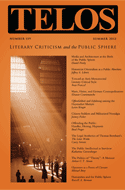Michael Bray’s “Openness as a Form of Closure: Public Sphere, Social Class and Alexander Kluge’s Counterproducts” appears in Telos 159 (Summer 2012). Read the full version online at the Telos Online website, or purchase a print copy of the issue here.
 This essay analyzes the seductions and impasses of the “openness” of public sphere theory in class society. It does so by sidestepping the more obvious limits of formal-discursive models of publicity and critically engaging with the theory and practice of Alexander Kluge, whose foundational work with Oskar Negt, Public Sphere and Experience, continues to ground experiential and affective models. For Kluge, this experiential turn was necessitated by the classist exclusions rationalist forms of publicity enact and it also made clear the need for “counterproducts” (rather than theoretical accounts) to combat audiovisual pseudo-publicity and construct a “proletariat public sphere.” Drawing together Kluge and Negt’s compelling account of exclusion and the specific character of Kluge’s own film and television counterproducts, shows how the latter fail to answer to the concerns the former, and helps explain the peculiar substitution, in Kluge’s films, of “feminine labor” and protagonists for the proletariat. This substitution, I suggest, is paradigmatic for the continuing shift of the “new left” away from issues of class. In closing, I propose the potential of a “populist public sphere” to more adequately address both the exclusions diagnosed by Kluge and Negt and the issues of gender “ciphered” in Kluge’s films.
This essay analyzes the seductions and impasses of the “openness” of public sphere theory in class society. It does so by sidestepping the more obvious limits of formal-discursive models of publicity and critically engaging with the theory and practice of Alexander Kluge, whose foundational work with Oskar Negt, Public Sphere and Experience, continues to ground experiential and affective models. For Kluge, this experiential turn was necessitated by the classist exclusions rationalist forms of publicity enact and it also made clear the need for “counterproducts” (rather than theoretical accounts) to combat audiovisual pseudo-publicity and construct a “proletariat public sphere.” Drawing together Kluge and Negt’s compelling account of exclusion and the specific character of Kluge’s own film and television counterproducts, shows how the latter fail to answer to the concerns the former, and helps explain the peculiar substitution, in Kluge’s films, of “feminine labor” and protagonists for the proletariat. This substitution, I suggest, is paradigmatic for the continuing shift of the “new left” away from issues of class. In closing, I propose the potential of a “populist public sphere” to more adequately address both the exclusions diagnosed by Kluge and Negt and the issues of gender “ciphered” in Kluge’s films.


